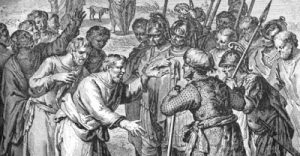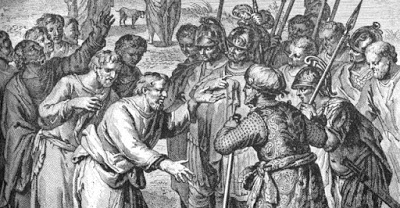
The book of Judges in the Bible narrates a series of intertribal and international wars waged by Israel as it settled the recently conquered land of Canaan. The central theme of the book of Judges is the rescue of the Israelite confederation at times of national crisis by the inspired intervention of a charismatic tribal chieftain or leader.
The judges are mostly shown as tribal leaders who delivered their people from oppression. Some were military leaders (Othniel, Ehud, Barak, Gideon, and Jephthah), some were lone warriors (Shamgar and Samson), and one was both leader and commander (Jephthah). Some judges were prophets (Deborah and Samuel), one was a Nazirite (Samson), some were also priests (Eli and Samuel), or sat in judgment (Deborah and Samuel), while the acts of others are not specified (Tola, Jair, Ibzan, Elon, and Abdon).[1]
One of the judges mentioned above, Jephthah, is perhaps most (in)famous for his unfortunately hasty oath-making (Judges 11:34–40). He is also known, however, for his war with the tribe of Ephraim (Judges 12:1–6). After his triumph in this conflict, Jephthah ruthlessly hunted down any lingering Ephraimites who had opposed him. It is in this narrative context that readers encounter the following:
Then Jephthah gathered all the men of Gilead and fought with Ephraim; and the men of Gilead defeated Ephraim, because they said, “You are fugitives from Ephraim, you Gileadites—in the heart of Ephraim and Manasseh.” Then the Gileadites took the fords of the Jordan against the Ephraimites. Whenever one of the fugitives of Ephraim said, “Let me go over,” the men of Gilead would say to him, “Are you an Ephraimite?” When he said, “No,” they said to him, “Then say Shibboleth,” and he said, “Sibboleth,” for he could not pronounce it right. Then they seized him and killed him at the fords of the Jordan. Forty-two thousand of the Ephraimites fell at that time. (Judges 12:4–6)
The shrewd Jephthah, in what is almost something out of a Tarantino film, was able to detect any clandestine Ephraimite attempting to escape by having him speak the word שבלת before he was granted permission to cross the Jordan to safety. The unlucky Ephraimite would give up the game by pronouncing the word in his local dialect as סבלת, which is identical accept for the s/sh (ש/ס). In other words, the Ephraimite’s pronunciation of the word as sibboleth instead of shibboleth betrayed his ethnicity and exposed him as an enemy.
From this passage we derive our modern word shibboleth, meaning “a custom, principle, or belief distinguishing a particular class or group of people,” or otherwise something that “distinguish[es] members of ingroups from those of outgroups, with an implicit value judgment based on familiarity with the shibboleth.”
That last part is important: “an implicit value judgment based on familiarity with the shibboleth.” Modern shibboleths are different from value-free group markers that just matter-of-factly distinguish groups of people; they are designed and maintained for the purpose of discriminating between insiders vs. outsiders, believers vs. infidels, we vs. they, the elect vs. the damned, sheep vs. goats. Those who fail to show familiarity with or allegiance to the group’s shibboleth(s) are judged as unworthy, as outsiders, or as the Other.
This is in keep with humanity’s most primal tribalistic urges. One might say it’s “natural” (cue the evolutionary biologist pointing to tribalistic behaviour in chimps) for humans to form tribes and discriminate against those who fail to enact the expected behaviour of the tribe. And on a strictly evolutionary level it’s understandable why we do it.
But remember, as King Benjamin reminds us, that the natural man is an enemy to God (Mosiah 3:19).
What sort of shibboleths do we see in the modern mainstream culture of The Church of Jesus Christ of Latter-day Saints? Plenty. Over time the human members of the Church have established cultural and institutional shibboleths that have ossified into tests of tribal loyalty and identity. These range from what clothing to wear (white shirts, not coloured shirts; nothing form-fitting), what hairstyles to have (conservative and un-flamboyant), what food to eat and beverages to drink (no caffeine), what media to consume (don’t watch rated-R movies), what sort of jewellery to wear (only one pair of earrings for women), how to act around figures of authority (always stand when a General Authority enters the room; give the presiding priesthood officer the sacrament first), and how to speak (don’t swear).
On it’s own this fact should not be all that surprising. After all, every human culture or group does this. This is not a uniquely Mormon thing. What is surprising, as well as disheartening, is how quickly orthodox members of the Church can mistake (often arbitrary and artificial) cultural shibboleths with inspired principles revealed by God, or even with eternal covenants made with God.
Now before liberal or progressive readers pat themselves on the back too quickly, there is little question that both sides of the cultural divide in Mormonism is guilty of this. Liberal and progressive Mormons have codified plenty of their own shibboleths within their own sub-group in Mormon culture. I came face-to-face with one of these shibboleths (and failed the test) just last week when I was roundly criticized by the liberal Mormon arm of Twitter for not immediately and unquestioningly validating ex-Mormons who suppose their hurt feelings justify duplicitous behaviour.
But again, this is not a Mormon or ex-Mormon or conservative or liberal thing: it’s a human thing.
So what steps can we take in Mormon culture to abolish harmful shibboleths that impede personal progression or cause others to stumble (or in worst cases outright leave the Church)? Here are three ideas for starters.
First, we should recognize that everyone harbours personal and group shibboleths. There is no use in pretending like you or your clan have transcended this very human instinct. It is not only naive but also hypocritical. “Why beholdest thou the mote that is in thy brother’s eye, but considerest not the beam that is in thine own eye?” (Matthew 7:3)
Second, we should think very carefully about what is and isn’t important in building Zion and edifying the Saints. In short, we should question our shibboleths. Does it really matter to God what coloured shirt someone wears when they pass the sacrament? Is someone really of morally dubious character if they have tattoos? If aunt Suzy likes to read the Ensign and not Sunstone or watch Fox News and not MSNBC, does that really make her an intellectually stunted simpleton, racist, or homophobe? Before we cast judgement on others because they don’t properly articulate our preferred shibboleths, we should ask ourselves if the outrage has any actual moral foundation in the first place.
Third, we should always strive to find wholesome and edifying ways to talk about these disconnects between members of our culture (and various sub-cultures). Even at those moments when we feel it is necessary to “reprov[e] betimes with sharpness,” the scripture reminds us it is crucial to “show[] forth afterwards an increase of love toward him whom thou hast reproved, lest he esteem thee to be his enemy” (Doctrine and Covenants 121:43).
Why is it so vital to rid ourselves cultural shibboleths in the modern Church? “Intertribal war was one of the manifestations of disunity that weakened Israel in the Period of the Judges,” observes Gordon and Rendsburg.[2] What was true for ancient Israel is true for modern Israel. Infighting, tribalism, and disunity is not sustainable in any society, and certainly not in the Church of Jesus Christ. “I say unto you, be one; and if ye are not one ye are not mine” (D&C 38:27).
One way as Mormons we can begin to diminish this in our own culture is to recognize what our shibboleths are and how we can work towards replacing them with the inspired principles and commandments of the gospel.
–Notes–
[1]: Yairah Amit, “Judges: Introduction and Annotations,” in A. Berlin & M. Z. Brettler, eds., The Jewish Study Bible (New York: Oxford University Press, 2004), 508.
[2]: Cyrus H. Gordon and Gary A. Rendsburg, The Bible and the Ancient Near East (New York: Norton, 1997), 181.

